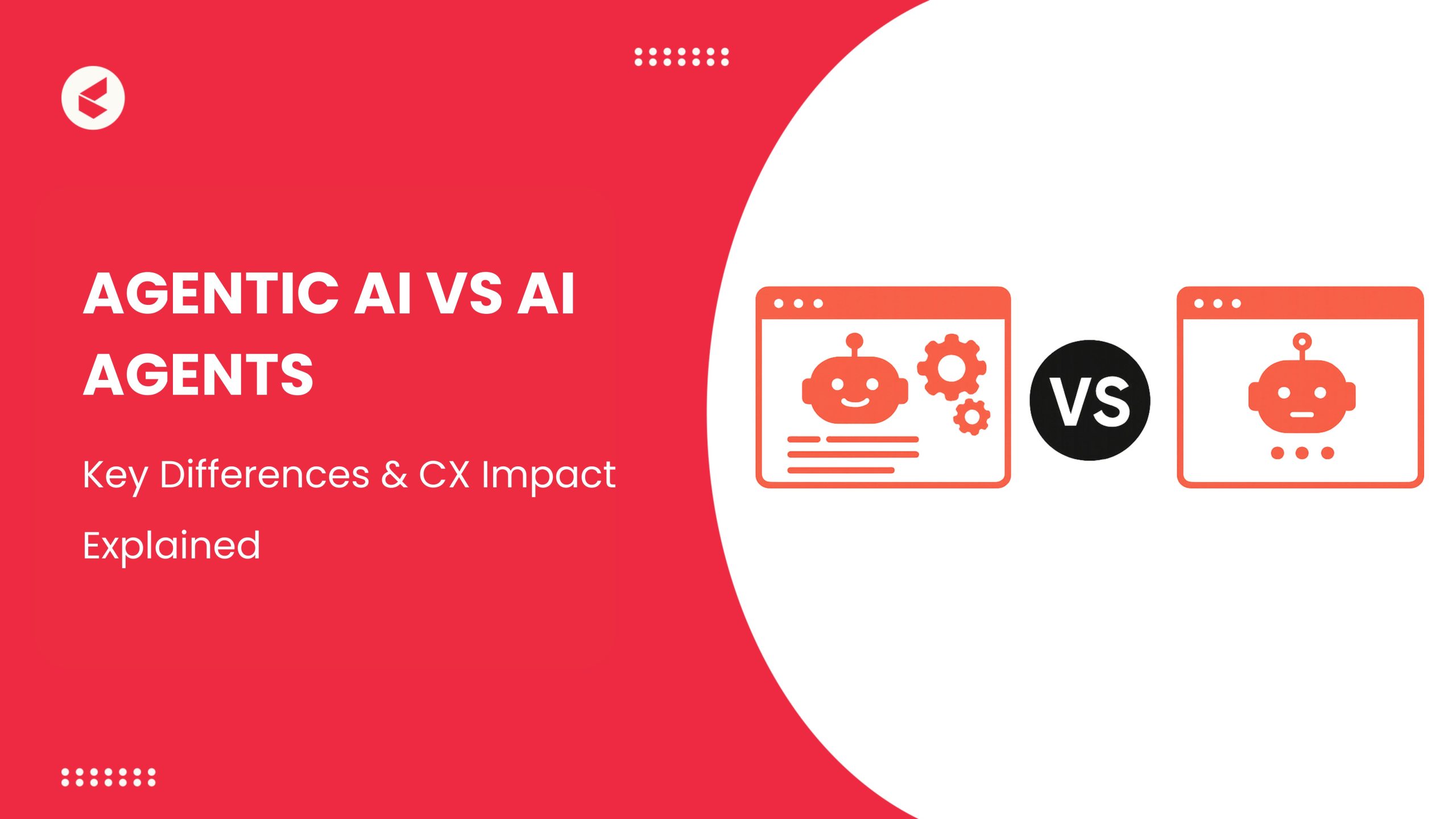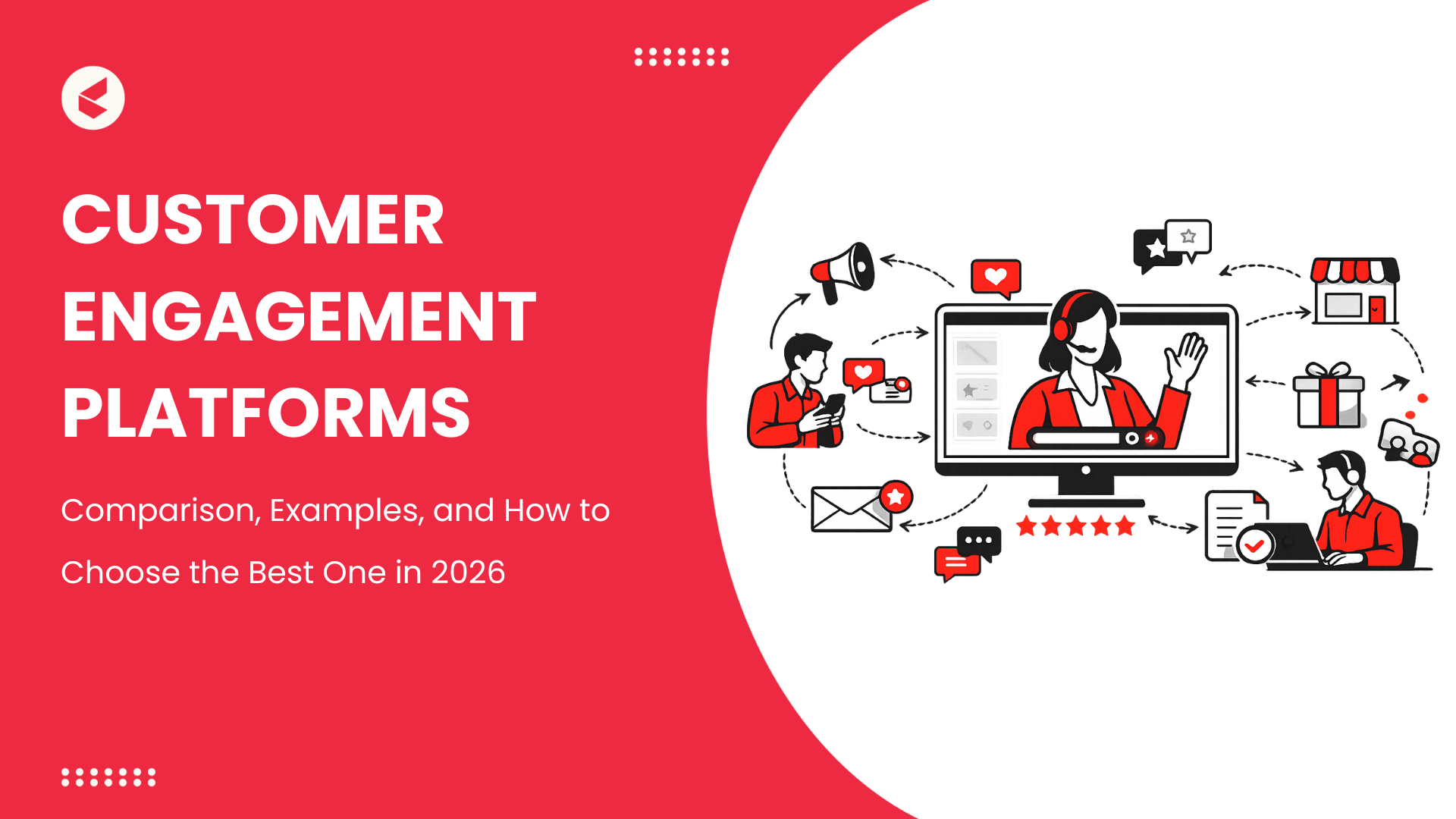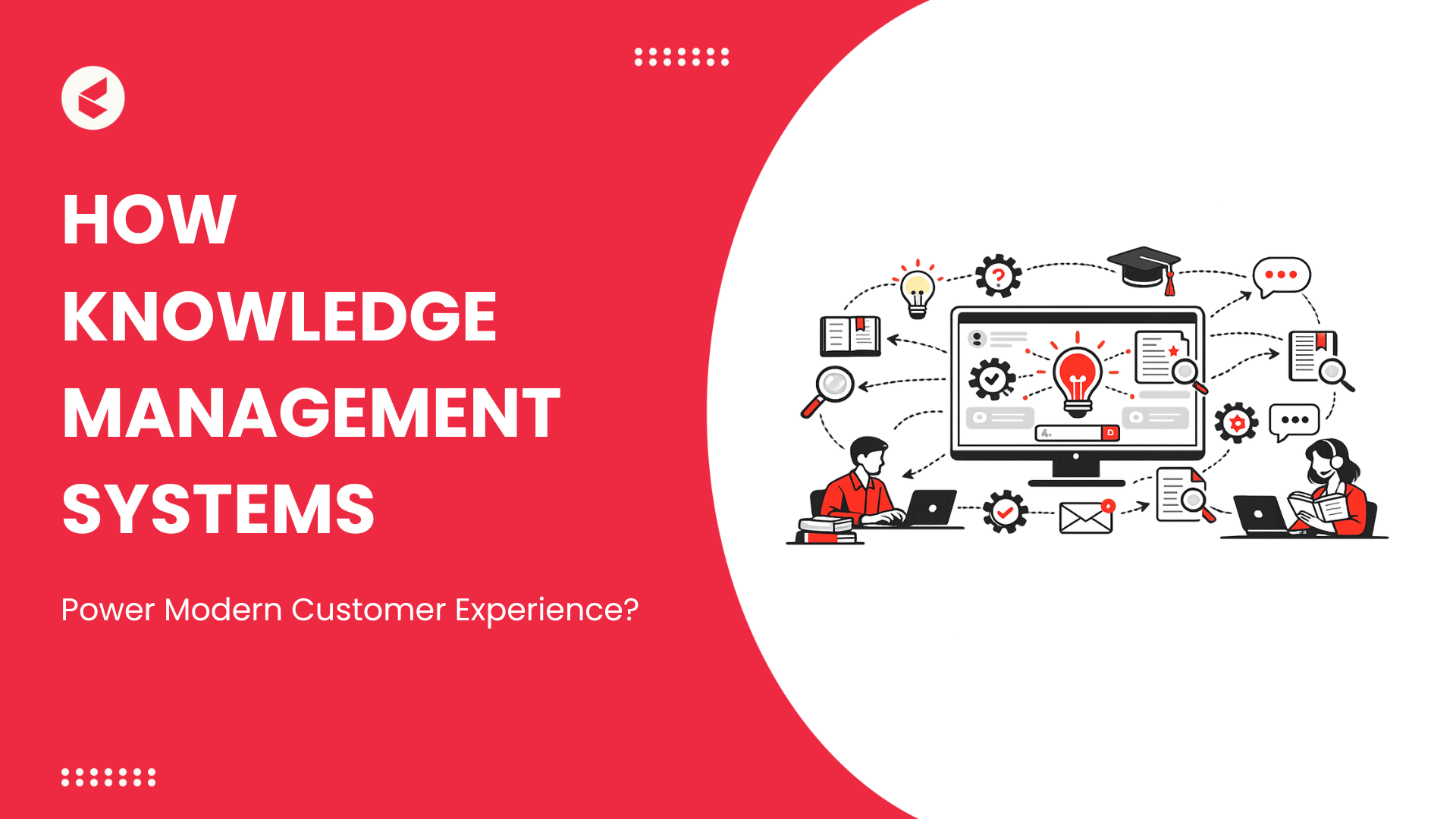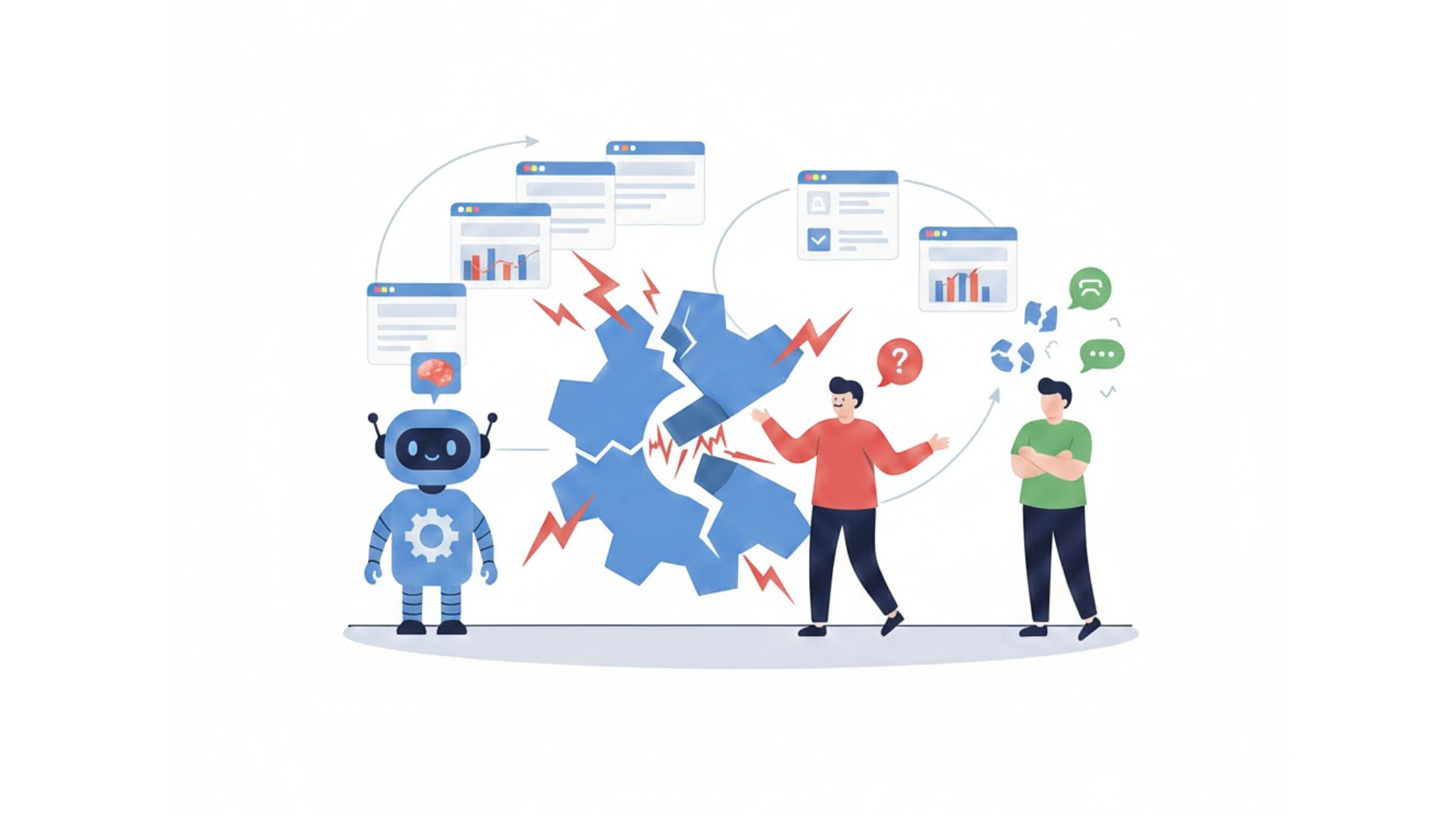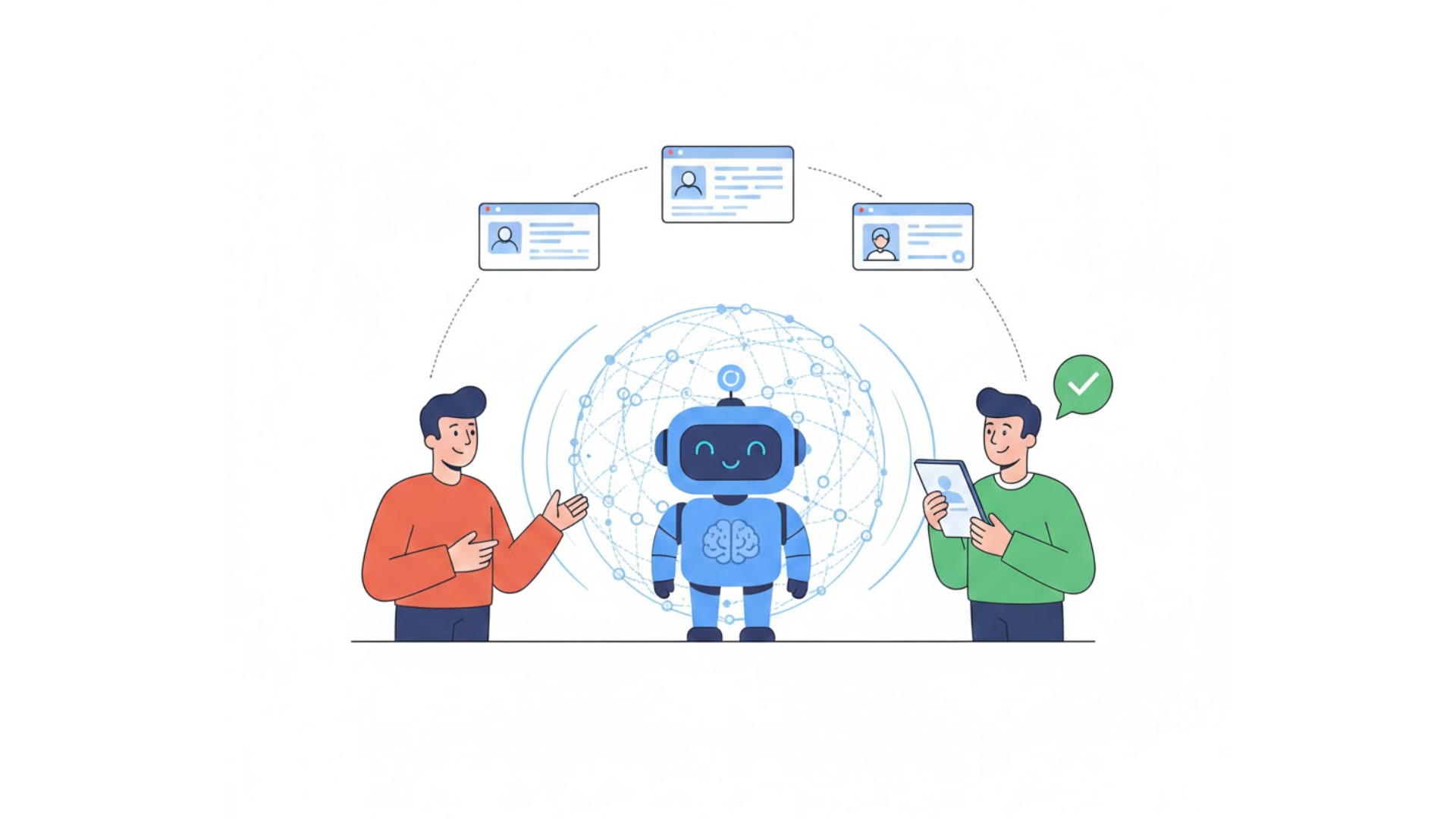The customer experience is the next competitive battleground. – Jerry Gregoire, CIO, Dell Computers.
In this battleground, AI will be handling 19 out of every 20 customer interactions in the future, according to Exploding Topics. AI agents, specifically, are bringing about this revolution faster by providing personalized responses to customers with their ever-evolving capabilities.
With the new Agentic AI, it’s only getting more powerful, delivering personalized and responsive service experiences at scale and speed.
However, it is important to understand the differences between AI agents and Agentic AI. While the terms sound nearly identical, they are fundamentally different technologies.
Agentic AI, for one, has the capability to deliver more advanced customer experiences to your customers as compared to plain vanilla AI agents. For example, agentic AI learns from service experiences and refines further interactions, unlike traditional AI agents. Agentic AI is a data-driven system that plans, executes, and adapts independently—without waiting for human intervention.
This blog helps you understand agentic AI vs AI agents and the key differences between them. You will also learn about the real-life use cases of both, so you know exactly how you can use them for your business needs!
Let’s explore how each model works and where they best apply.
Defining the Basics: What Are AI Agents?
AI agents are rule-based chatbots or virtual agents that are designed for specific tasks. They require predetermined inputs and clear objectives to work properly. They are like digital assistants that gather information, plan actions, and execute plans according to predefined rules and parameters.
For example, website chatbots are most often AI agents programmed to answer FAQs or the most common queries the company gets. HDFC Bank’s Eva chatbot on their mobile app is a good example of an AI agent.
Unless powered by machine learning or more advanced AI (like NLP), AI agents cannot self-improve without more training data.
What is Agentic AI?
According to CSAIL Alliances, around 33% of organizations are expected to use Agentic AI by 2028, up from 1% in 2025.
Agentic AI is an extension of traditional AI agents, introducing decisional autonomy into customer service.
It is a goal-oriented assistant that makes suitable, goal-focused decisions based on gathered information. Agentic AI can interact with data and enterprise systems for the information it needs to achieve its goals.
Agentic AI is self-learning and situationally aware, enabling it to continually improve over time. It can adjust its service strategies autonomously to align the outcomes with its goals.
For example, agentic AI can easily guide complex customer interactions involving multilevel decisions and data from multiple sources (inventory, CRM, store, etc.). Moveworks’ agentic AI agents offer a real-world example, currently used by global brands like Equinix and Power Design for IT support and self-service.
Agentic AI vs AI Agents: The Key Differences
Let’s break down AI agent vs agentic AI differences in the following table:
| Feature | Traditional AI agent | Agentic AI |
| Autonomy | Work on reactive and rule-based AI models Dependent on predefined scripts and requires specific triggers | Work on proactive and goal-oriented AI models Capability to perceive, plan, and act autonomously |
| Adaptability | Agent is static and doesn’t learn without additional training data | Agent is dynamic and constantly learns and improves with each interaction and feedback |
| Understanding of context | Agents do not store context over different sessions. Customers may need to repeat themselves. | Agents remember customer history, including previous interactions, orders, and tickets |
| Integration and tool use | Works within a controlled, predefined environment, often with minimal integration with other systems. | Works well with integrated external systems, tools, APIs, etc., to make autonomous decisions and achieve goals |
| Example | A traditional chatbot can tell customers the status of their order if the information is already present within its own data. | Agentic AI can help customers with order status, and help with rerouting packages, updating the customer’s loyalty points, processing exchanges and returns, etc. |
Agentic AI clearly outpaces traditional AI agents in autonomy, adaptability, and decision-making—making it the smarter choice for complex, high-volume customer interactions across integrated enterprise systems.
Why It Matters for CX Platforms
It may seem like overkill to give autonomy capabilities to an AI module, but in the world of CX, it is more than necessary today. Here are a few compelling reasons that underscore why it matters:
1. Hyper-personalization Wherever You Want It
And this is where Agentic AI shines — it studies and analyzes historical customer interactions to deliver thoughtful, proactive enhancements during live support, creating a more personalized experience.
McKinsey highlights this shift — 71% of customers expect personalization, and 76% get frustrated when they don’t receive it.
In fact, personalization boosts fast-growing companies’ revenues by 40%.
2. Reduces Agent Burnout, Improves Productivity
Gartner highlights that agentic AI is set to resolve almost 80% of common customer interactions autonomously.
Agentic AI handles large volumes of customer interactions autonomously, including complex, multilayer conversations, without human intervention. Your agents thus get more time and mental bandwidth for strategic and critical thinking customer queries, contributing more to the company. Understanding the types of AI agents available can help you choose the right ones to complement your team and business needs.
3. Reduced Costs
Contact centers usually function at higher operational expenses. According to Winvesta, with agentic AI, you reduce nearly 50% of these costs.
Your contact centre functions with enhanced efficiency, autonomy, and at higher scales to resolve more conversations with higher success rates.
A hybridized mix of AI agents vs agentic AI brings the best of both worlds to your customer service. As an AI-native customer experience platform, Kapture CX enables enterprises to strategically combine rule-based and agentic AI to build intelligent AI companions that scale with your customer needs.
Real-Life Use Cases
The capability to make autonomous decisions makes agentic AI useful in several spheres of customer service. Here are a few use cases where you can try out agentic AI in your enterprise:
- Automate beyond FAQs with Agentic AI: Agentic AI is capable of handling customer FAQs beyond the list of pre-defined questions. When a customer posts a query that is not in the FAQ list, they still get a resolution.
- Sentiment analysis for smart ticket routing: Kapture’s sentiment detection can connect your customers with the most relevant query resolution process by analysing their sentiment using Agentic AI. Diffuse the dissatisfaction by prioritizing their tickets.
- Set up adaptive workflows: Use agentic AI to customize and adjust workflows for your HR department, streamlining employee onboarding and interaction with company systems.
- Detect churn before it happens: Agentic AI understands subtle conversation cues (by combining contextual awareness, machine learning, and NLP) and autonomously takes decisive action to prevent customer churn. Empower it to offer discounts, offers, quick resolutions, and refunds to reduce churn proactively.
- Personalize upsells: Agentic AI can be an excellent shopping assistant. Use them to analyze your customers’ purchase and browsing history to suggest relevant and targeted upsells and enhance sales.
- Hybrid AI: Achieve end-to-end automation by applying a mix of agentic and traditional agents with Kapture’s voice and non-voice AI to encourage autonomous decisions while retaining full control of your CX processes. Design conversational agents, AI for support teams, Q&A AI, and much more with Kapture CX.
- Enhancing Support with AI in Quality Assurance: Many organizations are streamlining customer experience operations, for example, by deploying automated tools to detect issues early. By integrating AI in Quality Assurance, businesses can proactively test and monitor systems, resulting in smoother, more reliable experiences for their users.
Benefits & Limitations
So, what do all these capabilities actually lead to? Agentic AI enables instant resolution for complex queries — no wait for a live agent.
Here are a few benefits your business gets to see with this technology:
- Quicker response time: Your customers don’t have to wait for a human agent to get on chat to resolve complex queries. Agentic AI can process refunds, expedite shipping and delivery, check inventory status in real-time for order-related queries, and perform more tasks quickly and faster than traditional AI.
- Better scalability: The capability to handle large volumes of conversations at multiple levels makes agentic AI highly scalable. You can rest assured that your CX capabilities will grow with your business.
- Autonomous resolutions: Agentic AI takes autonomous decisions by analyzing real-time data, reducing the reliance on human intervention. Integrated systems ensure that AI has enough information to provide effective customer support in accordance with SLAs.
The Future: Hybrid Approach in Customer Support
The future of customer experience is poised at the intersection of traditional and agentic AI – a hybrid model that maximizes efficiency and personalization in customer experience.
Enterprises are set to optimize resource allocation by using automated responses for simple tasks while leveraging agentic AI for more complex and challenging scenarios.
There is tremendous scope for enhancing customer journeys by introducing elements of instant gratification for common queries with traditional AI. On the other hand, agentic AI helps with intricate issues to minimize frustration.
This helps organizations scale seamlessly in short periods.
Enterprises can explore the futuristic capabilities of agentic-traditional hybrids with Kapture CX’s enterprise AI, which adapts and scales with the business and its needs. With hybrid AI, businesses can empower agents, improve resolution speed, and scale CX intelligently.
Agentic AI vs AI Agents: Choose the Hybrid Route for Success
Customer expectations are changing faster than organizations can keep up. Given this, agentic AI has no recourse but to become mainstream with enterprises very quickly.
By combining decision-making autonomy with real-time learning, Agentic AI empowers CX teams to handle volume, complexity, and personalization — all at scale
Elevate your customer experience design with smarter strategies using a combination of traditional and agentic AI, a key offering of Kapture CX. Kapture’s CX-driven AI modules help enterprises empower their businesses, agents, and customers with data-powered intelligence and decisional autonomy.
Reimagine your customer service, agent workspaces, quality audits, and experience workflows with hybrid AI for efficient, goal-oriented outcomes.
Curious how this could work for your team? Book a quick demo to explore Kapture’s AI in action.
FAQ
Agentic AI requires initial oversight to monitor if the decisions it is taking are aligned with enterprise goals. Once this fine-tuning is achieved, agentic AI is extremely reliable.
You may need to intervene in agentic AI workflows when they require validation, accountability, or when there is an ethical aspect to consider.
Yes, you can create an online shopping assistant using Agentic AI by training the AI model about your products, style guide, customer preferences, and trends.
